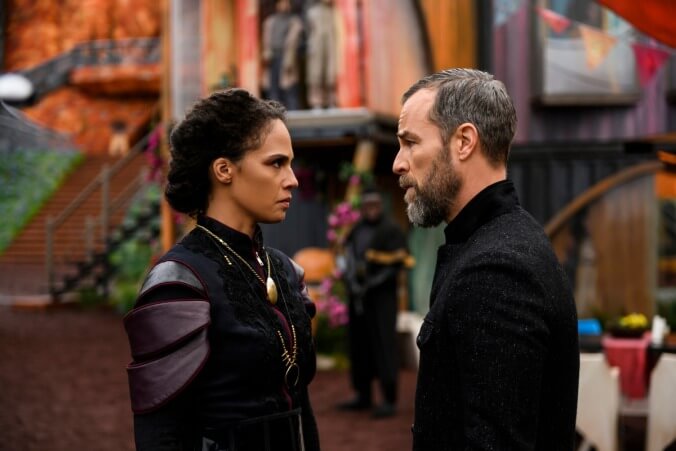There have been episodes this season that have felt thematically similar to other seasons in a way that was troublesome, as if The 100 didn’t have anything left to say about what living in a post-apocalyptic world can tell us about our lives today. Some of that comes down to plotting, as season six has largely gone down the same path as previous seasons, with Clarke, Bellamy, and their friends once again encountering an “other” that, over time, becomes a threat.
With that said, season six deserves some credit for going to different places, and playing with narrative storytelling in interesting ways. There’s been a slowburn quality to the reveals in Sanctum, with the true nature of the Primes, and the consequences that come with that knowledge, rolling out over numerous episodes. It’s been satisfying in terms of drama, and the inclusion of bottle-ish episodes, namely the one inside Clarke’s head and the early-season episode that saw everyone fall under the effects of the Red Sun, has kept this season fresh despite the familiar territory.
Still, The 100 is particularly focused on the way morality becomes a murky bit of business in times of chaos, violence, and survival. This season hasn’t always managed to draw a connection between Clarke’s people and those of Sanctum, but “Matryoshka” is the most distinct evidence yet that the writers and showrunners want us to question how we view everyone populating our screen.
In essence, as we learn more about Sanctum, Russell, Josephine, and the Primes, The 100 asks us to question whether they’re really any different than Clarke, Bellamy, Murphy, and everyone else. It’s an interesting premise. Past seasons have made the bad guys more, well, obviously bad, whereas this season has waded into muddy waters. The show has made an obvious attempt to suggest that The Primes and The 100 are similar. They’ve both done what they needed to do to survive, and who’s to say what’s right and wrong in such situations?
That makes for some compelling TV here and there. Josephine and Clarke’s strange, brain-sharing relationship has been a highlight, especially in this week’s episode as the two struggle to both get along in order to survive while also understanding that only one of them may get out alive. Similarly, the stories within Sanctum have made for interesting parallels, with Russell depicted as a Clarke-like figure, one who may murder some people here and there, but feels real bad about doing it.
In some ways, this gray area is fascinating. It complicates the relationships we see on screen, and it makes sure that we as viewers are always questioning the supposed protagonists. At the same time, that gray area means that the show is refusing to take any sort of stand. By not drawing a line between the actions of each faction, The 100 implicitly endorses both. That’s a troublesome outlook as the season carries on, and as the bodies pile up and the motivations of the Primes is revealed to be rather sinister.
I’m not saying The 100 is letting the Primes off the hook, but in the show’s attempts to question what regular people would do in times of survival, it’s risking refusing to take a moral stand. One of best moments in this week’s episode comes after Murphy has accepted that he will be sacrificed by Russell for Maddie’s wrongdoing, and in the process has been revealed as the traitor who gave up Clarke’s body. Raven, ever the bearer of wisdom, tells Murphy that his fear of dying is completely justified, but the path that leads away from Hell isn’t through immortality, but rather morality. It’s a great line, and one that lands hard. Murphy clearly feels it, and we do too.
But the show itself doesn’t seem to grasp that concept. This season, and this episode in particular, is too quick to “understand” the actions of the Primes in an effort to establish some sort of moral complexity. But that complexity needs resolution of some sort. To say that centuries of sacrificing innocent people, tricking them into thinking that the Primes are Gods who need host bodies, is akin to Clarke keeping her people alive in a time of war is simply ridiculous. And yet, The 100 wants to push that angle again and again.
I struggle with how much this all really matters, to be honest. This has been a compelling season, different from past seasons in ways that have felt refreshing and creatively inspired. But there’s this lingering, uneasy feeling that the show’s need to present the actions of “both sides” as equitable has allowed the entire season to operate in a moral vacuum, refusing to take a stance one way or the other. Moral complexity is a good thing, and The 100 has traded in it since the beginning, but is there a cost? Thematic murkiness is admirable and intriguing, but at some point The 100 needs to take a stand, and offer up answers rather than questions.
Stray observations
- You can’t kill off Henry Ian Cusick and then show me a “hatch” in the next episode! That’s too many feelings!
- “Your daughter is dead too.” Maybe Simone deserved that glass to the throat.
- Ryker remains a pivotal character to this season’s larger arc, and yet totally uninteresting at the same time.
- “I wasn’t always like this.” I did enjoy this bit of moral murkiness. Josephine’s past doesn’t excuse her behavior, but it does clarify it in a way that feels meaningful, and not just a narrative trick to create moral conflict.

 Keep scrolling for more great stories.
Keep scrolling for more great stories.
